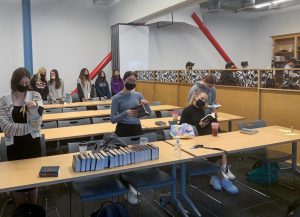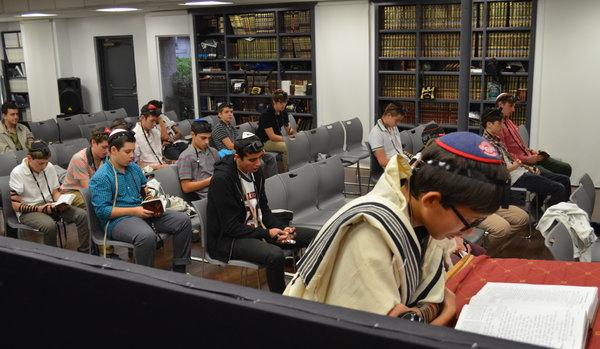EDITORIAL: Let Town Hall vote on Hashkama Minyan
The early-morning Hashkama Minyan, started in 2013, had grown to be the most popular prayer service on campus, sometimes with more than 100 people attending at 7:20 a.m.
October 10, 2021
Hashkama Minyan is a prime example of what sets Shalhevet apart from other high schools: a completely student-initiated, student-run davening service, started in 2013, free of administrative intervention but that still maintains focused prayer mostly free of talking.
Starting at around 7:20 am, the minyan also reduces travel time for students who have lengthy drives to Shalhevet, including those who live in the Valley and encounter more traffic for the normal start time of 8 a.m.
In the past, students who attended also enjoyed having a free period while others were praying at the regular time, after first period.
Now, without any community input, Hashkama has been limited to students enrolled in the Advanced Gemara Shiur and the Beit Midrash Track. No one else may attend.
At the same time, the school has erased many other davening options for students, such as the women’s singing minyan and the Hasidic meditation minyan, which helped improve students’ prayer experience.
Shalhevet made these changes, which affect nearly every student in the school, not only without student input but with weak explanations. Judaic Studies Director Rabbi David Stein said officials wanted to replicate the unity achieved last year during Covid, when one or two grades would pray together on the roof divided only into Sephardic and Ashkenazic styles.
“Everyone was davening in them every day,” Rabbi Stein said, “and we kind of said, we want to have our school together, we want to have everybody at the same time.”
Dean of Students Rabbi Schwarzberg added that the temptation for a free period caused some people to skip davening altogether, and besides, davening is not something that students can decide on because it relates to curriculum.
Instead, he invited Agenda Chair Jack Sanders plus a hand-picked group of seniors to a meeting to discuss the new policy, but not to decide.
A school-wide discussion might have raised several points, including that last year’s group davening usually involved only half the school at a time, not everyone, since not all grades were on campus at once. Or that our parents choose different shuls. Deciding exactly how and where to daven is a choice made by almost every praying Jew.
It’s hard to remember the last time the student body as a whole was consulted on a policy change that would affect them all, as envisioned by Dr. Friedman whose research showed this led to moral development. This was the founding vision of the school and the reason innovations like Hashkama were created in the first place. Now it exists only when students bring proposals of their own.
To cancel Hashkama, a student-run activity that started as a student idea, without consulting the student body goes against what Shalhevet stands for.
The Just Community should discuss and then vote on whether to reinstate Hashkama. If the measure passes, we’ll know that Shalhevet students still want to decide which Minyan they should pray in. If it fails, the administration’s new policy will stand. Making students heard is a core value of the Just Community, and giving students the freedom to choose which minyan they would like to attend is a way to accomplish that.
Hashkama Minyan was started by and because of students, run by them for eight years, and then disbanded with no input from the student body. This is undemocratic and wrong. The school year is just getting started and there’s still time to fix it.















